UNCC 300: Analysis of Global Issue: University Fee Disparity
VerifiedAdded on 2020/05/08
|7
|1676
|201
Essay
AI Summary
This essay, prepared for UNCC 300, examines the global issue of unequal university fees, particularly focusing on the situation in Australia where international students often face significantly higher tuition costs than local students. The essay highlights the lack of shared responsibility for the common good, as universities' fee structures create financial barriers for many deserving students. It explores the inequity of these fees, which prevents students from diverse backgrounds from accessing quality education. The essay proposes several solutions, including government intervention to regulate fees, scholarship programs based on merit, and the creation of earning programs like internships to support students financially. The author emphasizes the importance of equal opportunities and support for international students to ensure their success and contribution to the country. The essay also references multiple sources to support its arguments, including Charlesworth and Macdonald (2014), Gibson et al. (2017), and Hulme et al. (2014).
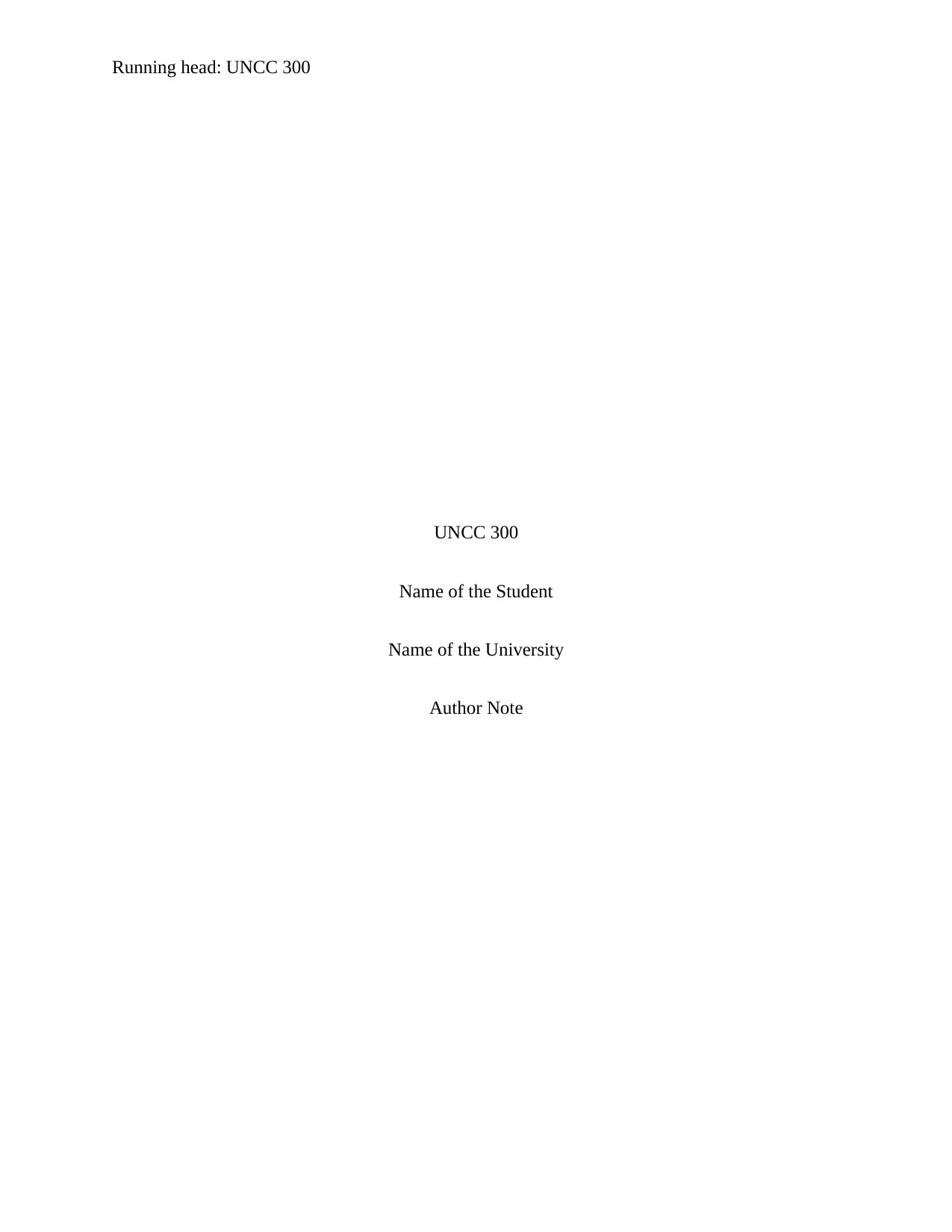
Running head: UNCC 300
UNCC 300
Name of the Student
Name of the University
Author Note
UNCC 300
Name of the Student
Name of the University
Author Note
Paraphrase This Document
Need a fresh take? Get an instant paraphrase of this document with our AI Paraphraser
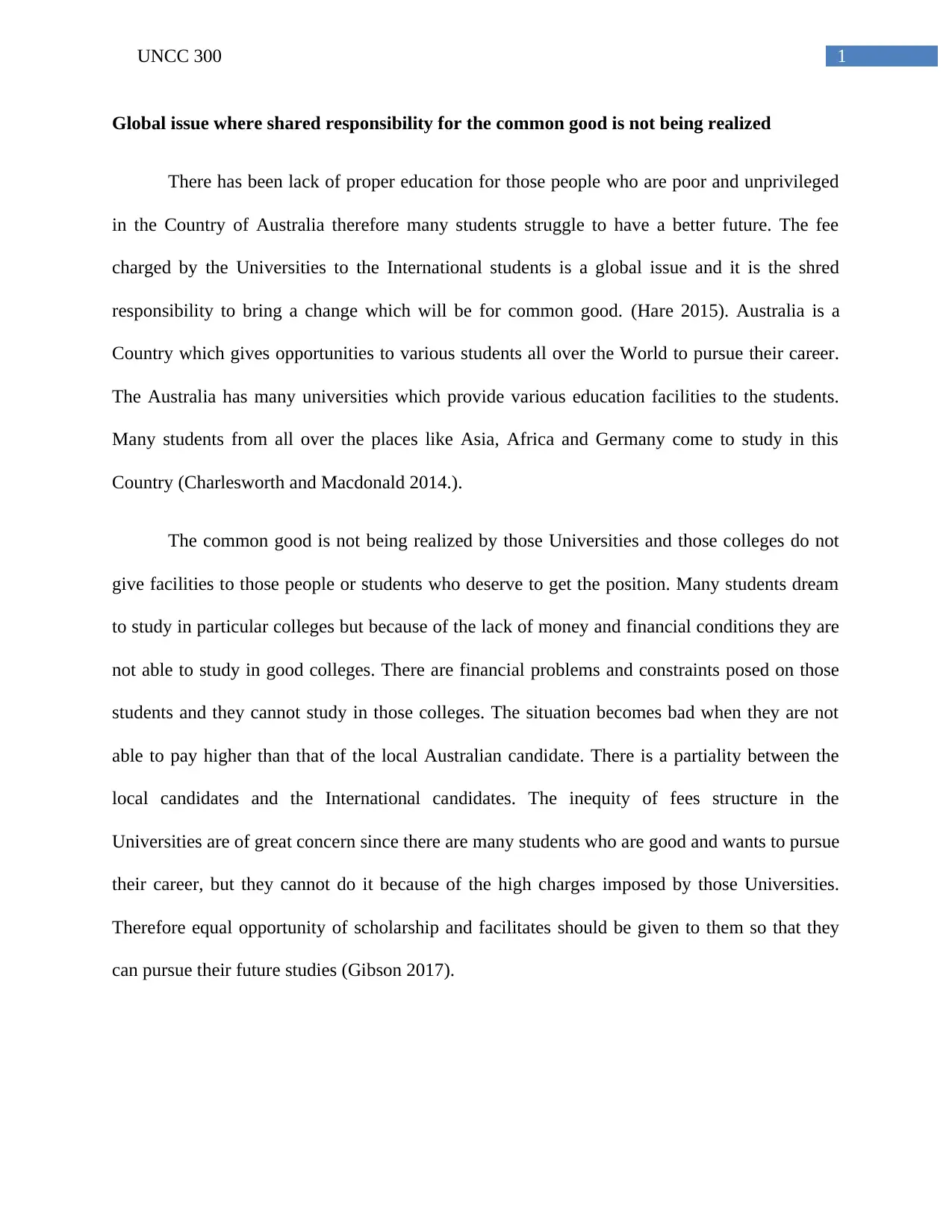
1UNCC 300
Global issue where shared responsibility for the common good is not being realized
There has been lack of proper education for those people who are poor and unprivileged
in the Country of Australia therefore many students struggle to have a better future. The fee
charged by the Universities to the International students is a global issue and it is the shred
responsibility to bring a change which will be for common good. (Hare 2015). Australia is a
Country which gives opportunities to various students all over the World to pursue their career.
The Australia has many universities which provide various education facilities to the students.
Many students from all over the places like Asia, Africa and Germany come to study in this
Country (Charlesworth and Macdonald 2014.).
The common good is not being realized by those Universities and those colleges do not
give facilities to those people or students who deserve to get the position. Many students dream
to study in particular colleges but because of the lack of money and financial conditions they are
not able to study in good colleges. There are financial problems and constraints posed on those
students and they cannot study in those colleges. The situation becomes bad when they are not
able to pay higher than that of the local Australian candidate. There is a partiality between the
local candidates and the International candidates. The inequity of fees structure in the
Universities are of great concern since there are many students who are good and wants to pursue
their career, but they cannot do it because of the high charges imposed by those Universities.
Therefore equal opportunity of scholarship and facilitates should be given to them so that they
can pursue their future studies (Gibson 2017).
Global issue where shared responsibility for the common good is not being realized
There has been lack of proper education for those people who are poor and unprivileged
in the Country of Australia therefore many students struggle to have a better future. The fee
charged by the Universities to the International students is a global issue and it is the shred
responsibility to bring a change which will be for common good. (Hare 2015). Australia is a
Country which gives opportunities to various students all over the World to pursue their career.
The Australia has many universities which provide various education facilities to the students.
Many students from all over the places like Asia, Africa and Germany come to study in this
Country (Charlesworth and Macdonald 2014.).
The common good is not being realized by those Universities and those colleges do not
give facilities to those people or students who deserve to get the position. Many students dream
to study in particular colleges but because of the lack of money and financial conditions they are
not able to study in good colleges. There are financial problems and constraints posed on those
students and they cannot study in those colleges. The situation becomes bad when they are not
able to pay higher than that of the local Australian candidate. There is a partiality between the
local candidates and the International candidates. The inequity of fees structure in the
Universities are of great concern since there are many students who are good and wants to pursue
their career, but they cannot do it because of the high charges imposed by those Universities.
Therefore equal opportunity of scholarship and facilitates should be given to them so that they
can pursue their future studies (Gibson 2017).
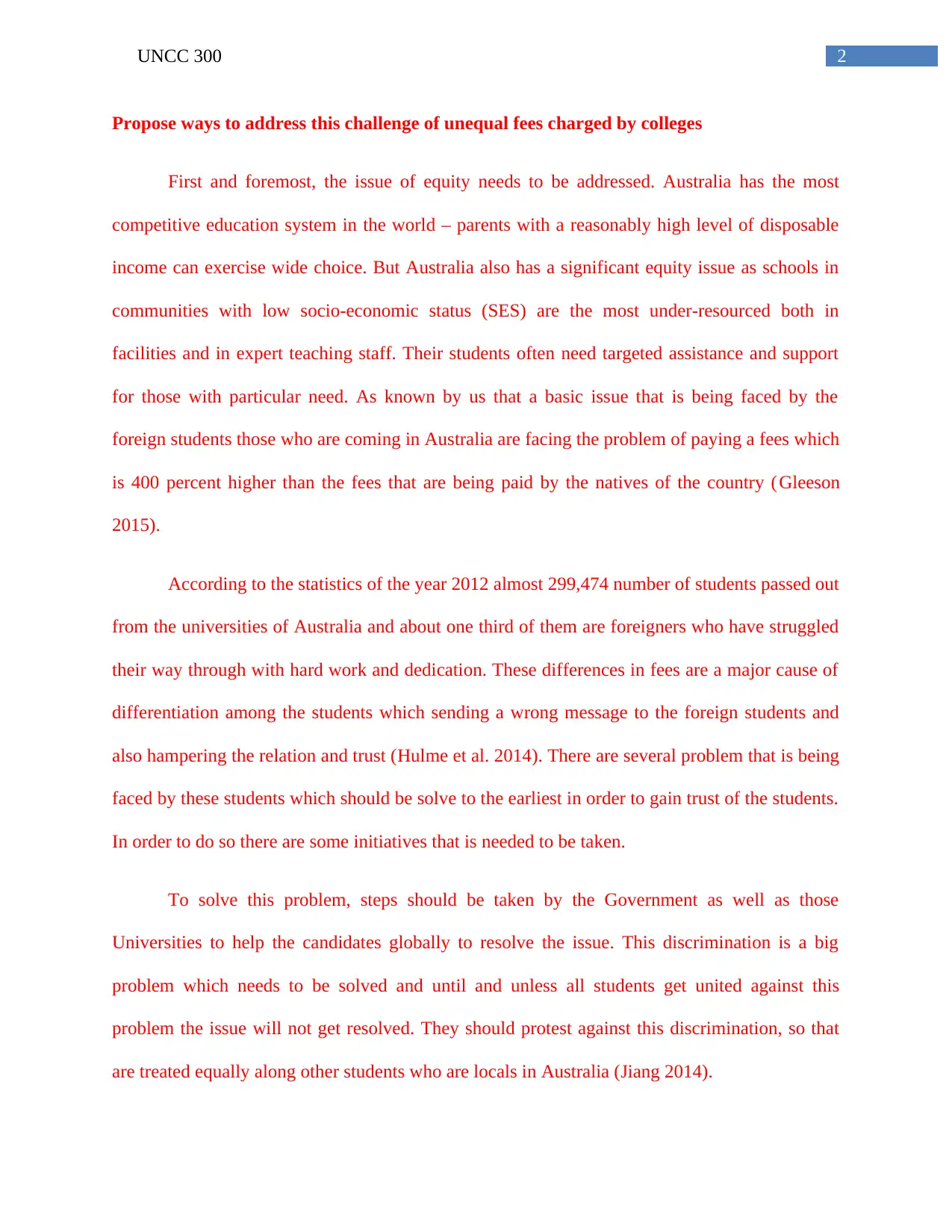
2UNCC 300
Propose ways to address this challenge of unequal fees charged by colleges
First and foremost, the issue of equity needs to be addressed. Australia has the most
competitive education system in the world – parents with a reasonably high level of disposable
income can exercise wide choice. But Australia also has a significant equity issue as schools in
communities with low socio-economic status (SES) are the most under-resourced both in
facilities and in expert teaching staff. Their students often need targeted assistance and support
for those with particular need. As known by us that a basic issue that is being faced by the
foreign students those who are coming in Australia are facing the problem of paying a fees which
is 400 percent higher than the fees that are being paid by the natives of the country (Gleeson
2015).
According to the statistics of the year 2012 almost 299,474 number of students passed out
from the universities of Australia and about one third of them are foreigners who have struggled
their way through with hard work and dedication. These differences in fees are a major cause of
differentiation among the students which sending a wrong message to the foreign students and
also hampering the relation and trust (Hulme et al. 2014). There are several problem that is being
faced by these students which should be solve to the earliest in order to gain trust of the students.
In order to do so there are some initiatives that is needed to be taken.
To solve this problem, steps should be taken by the Government as well as those
Universities to help the candidates globally to resolve the issue. This discrimination is a big
problem which needs to be solved and until and unless all students get united against this
problem the issue will not get resolved. They should protest against this discrimination, so that
are treated equally along other students who are locals in Australia (Jiang 2014).
Propose ways to address this challenge of unequal fees charged by colleges
First and foremost, the issue of equity needs to be addressed. Australia has the most
competitive education system in the world – parents with a reasonably high level of disposable
income can exercise wide choice. But Australia also has a significant equity issue as schools in
communities with low socio-economic status (SES) are the most under-resourced both in
facilities and in expert teaching staff. Their students often need targeted assistance and support
for those with particular need. As known by us that a basic issue that is being faced by the
foreign students those who are coming in Australia are facing the problem of paying a fees which
is 400 percent higher than the fees that are being paid by the natives of the country (Gleeson
2015).
According to the statistics of the year 2012 almost 299,474 number of students passed out
from the universities of Australia and about one third of them are foreigners who have struggled
their way through with hard work and dedication. These differences in fees are a major cause of
differentiation among the students which sending a wrong message to the foreign students and
also hampering the relation and trust (Hulme et al. 2014). There are several problem that is being
faced by these students which should be solve to the earliest in order to gain trust of the students.
In order to do so there are some initiatives that is needed to be taken.
To solve this problem, steps should be taken by the Government as well as those
Universities to help the candidates globally to resolve the issue. This discrimination is a big
problem which needs to be solved and until and unless all students get united against this
problem the issue will not get resolved. They should protest against this discrimination, so that
are treated equally along other students who are locals in Australia (Jiang 2014).
⊘ This is a preview!⊘
Do you want full access?
Subscribe today to unlock all pages.

Trusted by 1+ million students worldwide
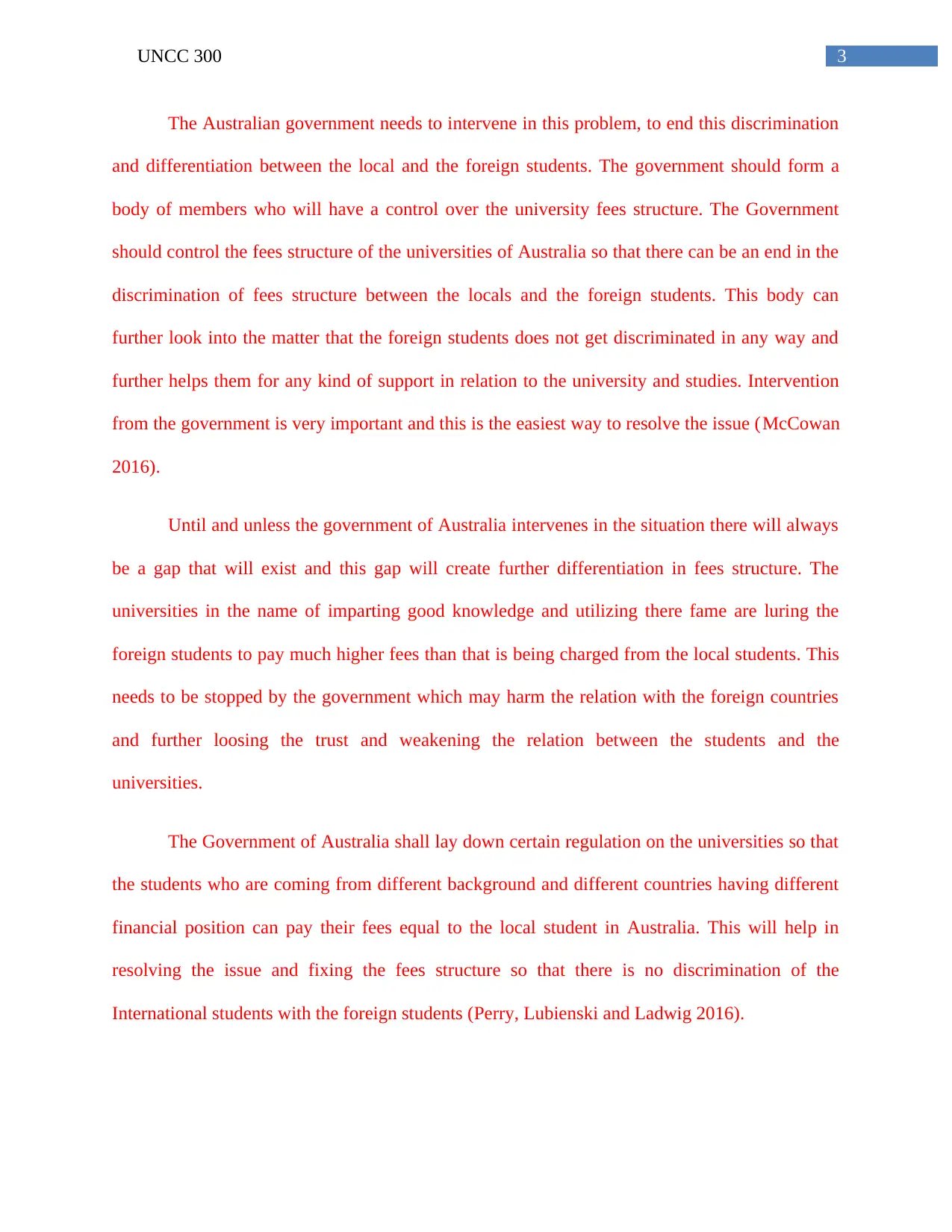
3UNCC 300
The Australian government needs to intervene in this problem, to end this discrimination
and differentiation between the local and the foreign students. The government should form a
body of members who will have a control over the university fees structure. The Government
should control the fees structure of the universities of Australia so that there can be an end in the
discrimination of fees structure between the locals and the foreign students. This body can
further look into the matter that the foreign students does not get discriminated in any way and
further helps them for any kind of support in relation to the university and studies. Intervention
from the government is very important and this is the easiest way to resolve the issue (McCowan
2016).
Until and unless the government of Australia intervenes in the situation there will always
be a gap that will exist and this gap will create further differentiation in fees structure. The
universities in the name of imparting good knowledge and utilizing there fame are luring the
foreign students to pay much higher fees than that is being charged from the local students. This
needs to be stopped by the government which may harm the relation with the foreign countries
and further loosing the trust and weakening the relation between the students and the
universities.
The Government of Australia shall lay down certain regulation on the universities so that
the students who are coming from different background and different countries having different
financial position can pay their fees equal to the local student in Australia. This will help in
resolving the issue and fixing the fees structure so that there is no discrimination of the
International students with the foreign students (Perry, Lubienski and Ladwig 2016).
The Australian government needs to intervene in this problem, to end this discrimination
and differentiation between the local and the foreign students. The government should form a
body of members who will have a control over the university fees structure. The Government
should control the fees structure of the universities of Australia so that there can be an end in the
discrimination of fees structure between the locals and the foreign students. This body can
further look into the matter that the foreign students does not get discriminated in any way and
further helps them for any kind of support in relation to the university and studies. Intervention
from the government is very important and this is the easiest way to resolve the issue (McCowan
2016).
Until and unless the government of Australia intervenes in the situation there will always
be a gap that will exist and this gap will create further differentiation in fees structure. The
universities in the name of imparting good knowledge and utilizing there fame are luring the
foreign students to pay much higher fees than that is being charged from the local students. This
needs to be stopped by the government which may harm the relation with the foreign countries
and further loosing the trust and weakening the relation between the students and the
universities.
The Government of Australia shall lay down certain regulation on the universities so that
the students who are coming from different background and different countries having different
financial position can pay their fees equal to the local student in Australia. This will help in
resolving the issue and fixing the fees structure so that there is no discrimination of the
International students with the foreign students (Perry, Lubienski and Ladwig 2016).
Paraphrase This Document
Need a fresh take? Get an instant paraphrase of this document with our AI Paraphraser
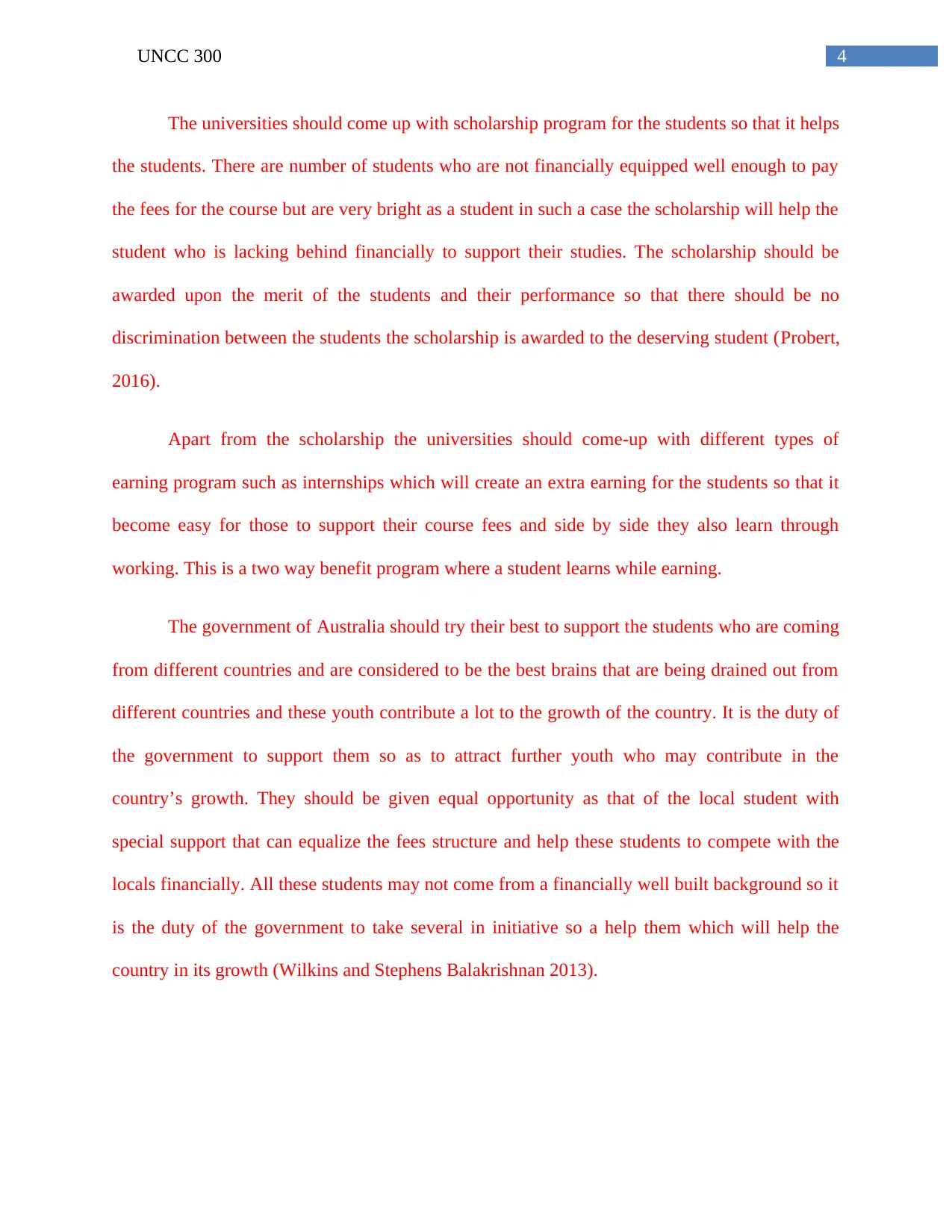
4UNCC 300
The universities should come up with scholarship program for the students so that it helps
the students. There are number of students who are not financially equipped well enough to pay
the fees for the course but are very bright as a student in such a case the scholarship will help the
student who is lacking behind financially to support their studies. The scholarship should be
awarded upon the merit of the students and their performance so that there should be no
discrimination between the students the scholarship is awarded to the deserving student (Probert,
2016).
Apart from the scholarship the universities should come-up with different types of
earning program such as internships which will create an extra earning for the students so that it
become easy for those to support their course fees and side by side they also learn through
working. This is a two way benefit program where a student learns while earning.
The government of Australia should try their best to support the students who are coming
from different countries and are considered to be the best brains that are being drained out from
different countries and these youth contribute a lot to the growth of the country. It is the duty of
the government to support them so as to attract further youth who may contribute in the
country’s growth. They should be given equal opportunity as that of the local student with
special support that can equalize the fees structure and help these students to compete with the
locals financially. All these students may not come from a financially well built background so it
is the duty of the government to take several in initiative so a help them which will help the
country in its growth (Wilkins and Stephens Balakrishnan 2013).
The universities should come up with scholarship program for the students so that it helps
the students. There are number of students who are not financially equipped well enough to pay
the fees for the course but are very bright as a student in such a case the scholarship will help the
student who is lacking behind financially to support their studies. The scholarship should be
awarded upon the merit of the students and their performance so that there should be no
discrimination between the students the scholarship is awarded to the deserving student (Probert,
2016).
Apart from the scholarship the universities should come-up with different types of
earning program such as internships which will create an extra earning for the students so that it
become easy for those to support their course fees and side by side they also learn through
working. This is a two way benefit program where a student learns while earning.
The government of Australia should try their best to support the students who are coming
from different countries and are considered to be the best brains that are being drained out from
different countries and these youth contribute a lot to the growth of the country. It is the duty of
the government to support them so as to attract further youth who may contribute in the
country’s growth. They should be given equal opportunity as that of the local student with
special support that can equalize the fees structure and help these students to compete with the
locals financially. All these students may not come from a financially well built background so it
is the duty of the government to take several in initiative so a help them which will help the
country in its growth (Wilkins and Stephens Balakrishnan 2013).
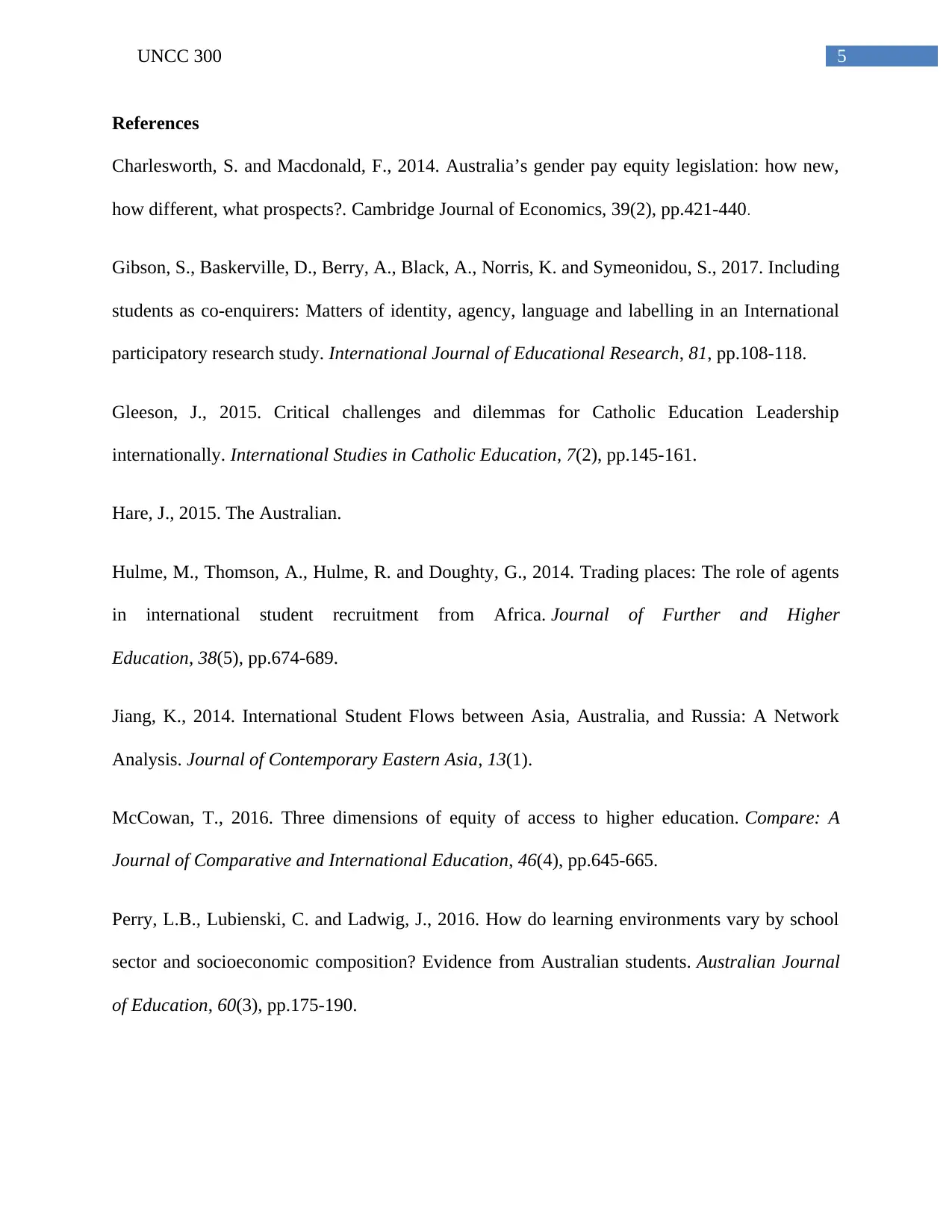
5UNCC 300
References
Charlesworth, S. and Macdonald, F., 2014. Australia’s gender pay equity legislation: how new,
how different, what prospects?. Cambridge Journal of Economics, 39(2), pp.421-440.
Gibson, S., Baskerville, D., Berry, A., Black, A., Norris, K. and Symeonidou, S., 2017. Including
students as co-enquirers: Matters of identity, agency, language and labelling in an International
participatory research study. International Journal of Educational Research, 81, pp.108-118.
Gleeson, J., 2015. Critical challenges and dilemmas for Catholic Education Leadership
internationally. International Studies in Catholic Education, 7(2), pp.145-161.
Hare, J., 2015. The Australian.
Hulme, M., Thomson, A., Hulme, R. and Doughty, G., 2014. Trading places: The role of agents
in international student recruitment from Africa. Journal of Further and Higher
Education, 38(5), pp.674-689.
Jiang, K., 2014. International Student Flows between Asia, Australia, and Russia: A Network
Analysis. Journal of Contemporary Eastern Asia, 13(1).
McCowan, T., 2016. Three dimensions of equity of access to higher education. Compare: A
Journal of Comparative and International Education, 46(4), pp.645-665.
Perry, L.B., Lubienski, C. and Ladwig, J., 2016. How do learning environments vary by school
sector and socioeconomic composition? Evidence from Australian students. Australian Journal
of Education, 60(3), pp.175-190.
References
Charlesworth, S. and Macdonald, F., 2014. Australia’s gender pay equity legislation: how new,
how different, what prospects?. Cambridge Journal of Economics, 39(2), pp.421-440.
Gibson, S., Baskerville, D., Berry, A., Black, A., Norris, K. and Symeonidou, S., 2017. Including
students as co-enquirers: Matters of identity, agency, language and labelling in an International
participatory research study. International Journal of Educational Research, 81, pp.108-118.
Gleeson, J., 2015. Critical challenges and dilemmas for Catholic Education Leadership
internationally. International Studies in Catholic Education, 7(2), pp.145-161.
Hare, J., 2015. The Australian.
Hulme, M., Thomson, A., Hulme, R. and Doughty, G., 2014. Trading places: The role of agents
in international student recruitment from Africa. Journal of Further and Higher
Education, 38(5), pp.674-689.
Jiang, K., 2014. International Student Flows between Asia, Australia, and Russia: A Network
Analysis. Journal of Contemporary Eastern Asia, 13(1).
McCowan, T., 2016. Three dimensions of equity of access to higher education. Compare: A
Journal of Comparative and International Education, 46(4), pp.645-665.
Perry, L.B., Lubienski, C. and Ladwig, J., 2016. How do learning environments vary by school
sector and socioeconomic composition? Evidence from Australian students. Australian Journal
of Education, 60(3), pp.175-190.
⊘ This is a preview!⊘
Do you want full access?
Subscribe today to unlock all pages.

Trusted by 1+ million students worldwide
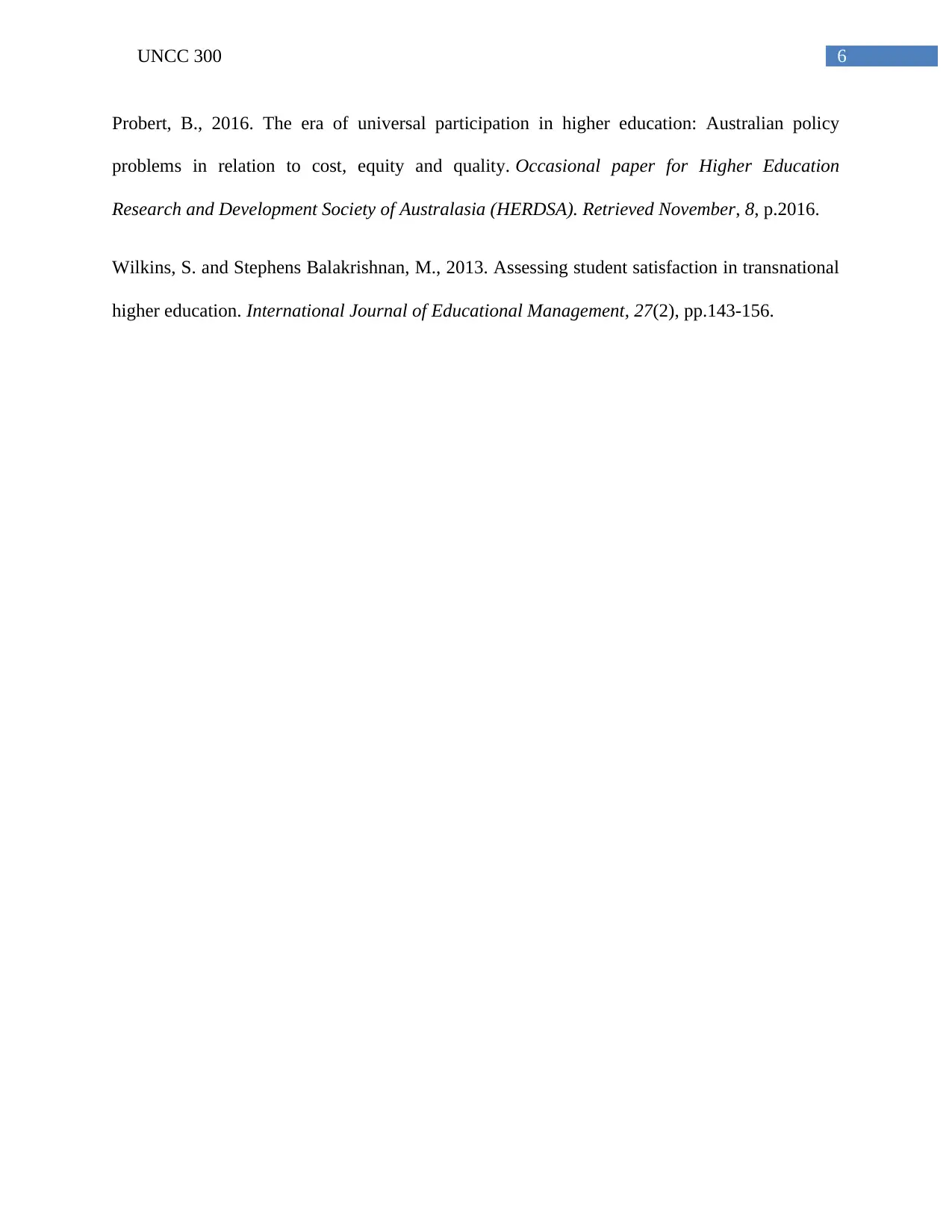
6UNCC 300
Probert, B., 2016. The era of universal participation in higher education: Australian policy
problems in relation to cost, equity and quality. Occasional paper for Higher Education
Research and Development Society of Australasia (HERDSA). Retrieved November, 8, p.2016.
Wilkins, S. and Stephens Balakrishnan, M., 2013. Assessing student satisfaction in transnational
higher education. International Journal of Educational Management, 27(2), pp.143-156.
Probert, B., 2016. The era of universal participation in higher education: Australian policy
problems in relation to cost, equity and quality. Occasional paper for Higher Education
Research and Development Society of Australasia (HERDSA). Retrieved November, 8, p.2016.
Wilkins, S. and Stephens Balakrishnan, M., 2013. Assessing student satisfaction in transnational
higher education. International Journal of Educational Management, 27(2), pp.143-156.
1 out of 7
Related Documents
Your All-in-One AI-Powered Toolkit for Academic Success.
+13062052269
info@desklib.com
Available 24*7 on WhatsApp / Email
![[object Object]](/_next/static/media/star-bottom.7253800d.svg)
Unlock your academic potential
Copyright © 2020–2026 A2Z Services. All Rights Reserved. Developed and managed by ZUCOL.





